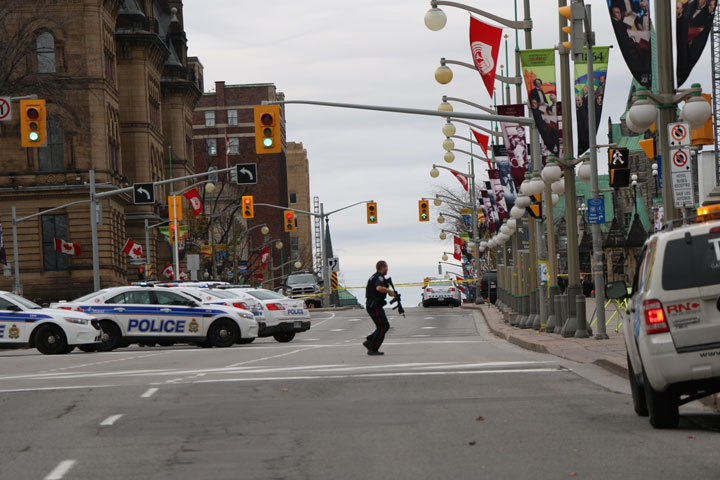The federal government’s proposed terror law, set to be unveiled Friday morning, could constitute minor tweaks to powers police never use anyway; or it could vastly expand law enforcement’s power to detain Canadians without charge and clamp down on freedom of speech in the name of fighting acts of terror we have no evidence a clampdown would prevent.

Detention without charge
Global News reported Wednesday that the Tories plan to effectively triple the amount of time a suspected terrorist can be held without charge: Right now, if police have reason to believe there’s an imminent terrorist act and detaining a person will prevent it, they can arrest him or her without charge if the person is brought before a judge within 24 hours, and if the judge okays a 72-hour window.
The proposal, Global’s Mike Le Couteur reported, would allow that window to be renewed by an additional 48 hours twice, for a total of seven days.
“If they start introducing measures that are much more extreme and then they start using them, you’re guaranteed to have constitutional challenges … and all sorts of issues with Section 7 rights and arbitrary detention,” said University of Ottawa law professor Craig Forcese.
And given that there’s no evidence police have used the power they have, many have asked why they need more.
READ MORE: As feds plan new anti-terror laws, some ask why current ones not being used
“Please explain to us why these quite expansive powers enacted back in 2001 are insufficient,” Forcese said. “What’s the explanation? And, really, there is no explanation.”
Arrest for ‘glorifying’ terrorism
Prime Minister Stephen Harper and his cabinet colleagues have hinted at legislation that would criminalize terror’s cheerleaders. They argue this kind of material helped radicalize the culprits behind a pair of attacks that shook the country last year, including Michael Zehaf-Bibeau’s Parliament Hill shooting spree. The wording has varied – the Prime Minister used the phrase “promotion” terrorism last Sunday. But this direct action appears to already be covered by laws already on the books.
“The stuff that really concerns people is already covered,” Forcese said. Recruitment videos, for example, could fall under any number of existing laws – participating in a terrorist group, for example, or counselling terrorist activity.
READ MORE: Road to radicalization difficult to chart
Expanding that prohibition to criminalize “glorifying” terrorism, however, could have serious freedom-of-speech implications.
“Saying ‘Hooray, the terrorists’ or waving the Tamil Tiger flag. … That’s allowed. That’s free speech,” Forcese said.
“That’s what ‘glorification’ is. So if you want to start throwing that precedent, and start throwing people in the clink for waving the wrong flag at a protest, or they’re too receptive to terrorist causes in terms of the things they say, well, you’re going to have a huge free speech case. It’s going to be an enormous constitutional challenge.”
And there’s little evidence of a causal link between opinions – even ones that are violent, odious or societally taboo – and acts of violence, Forcese said.
A paper Forcese wrote with University of Toronto law professor Kent Roach notes that the government has hinted at criminalizing the “glorification” of terrorism since 2007 – this is hardly a new suggestion, although recent attacks both in Canada and abroad make it timely.
“Glorification offences would criminalize the expression of radical and unpopular sentiments that are not closely connected with violence,” the paper reads. “Such offences would be constitutionally overbroad compared to existing offences and they would present substantial downside risk with very little upside benefit.
Forcese argues, it would do nothing to fight terror. It could even do the opposite.
“It plays into the al-Qaeda-inspired discourse that the West is at war with radical Islam – ‘Look at them, they purport to have free speech, but look how they apply it’ … It plays into that discourse, which is obviously, strategically, a huge mistake,” he said.
It could also drive these same sentiments underground, making it tougher to counter (and, in law enforcement’s case, monitor) it.
“The solution to the problem of radicalization is never going to be, put enough people in jail and hope that they get better in jail.”
The chill such a law would create over free speech would also make it almost impossible to do the kind of community outreach and de-radicalization Canadian law-enforcement is attempting, said University of Calgary politics professor Michael Zekulin.
“When we talk about counter-radicalization and trying to challenge ideas that some in these groups are trying to propagate on the internet or wherever, you kind of have to have a free exchange of ideas, here,” he said. “You want to be able to have those frank discussions.”
Do we need new laws for ‘lone wolf’ terrorists?
Constitutional objections to the new legislation aside, Zekulin argues the issue of new counter-terror legislation is a discussion worth having.
“There is a reason we are having this conversation and the reason is this sort of larger paradigm shift in terrorism and the types of attacks we’re seeing,” he said.
Many post-9/11 counter-terror laws addressed threats from relatively organized, relatively sophisticated groups, often in contact with others abroad – not the marginalized individuals acting alone on a much smaller scale, Zekulin said.
But Zehaf-Bibeau, Moncton shooter Justin Bourque and Saint-Jean-Sur-Richelieu’s Martin Couture-Rouleau present a very different kind of culprit.
“If you’re talking about an individual, or even two people, who don’t necessarily have that same degree of contact, if they’re not going to the hardware store to buy chemicals … it is really difficult,” Zekulin said.
“The discussion over whether we need to develop new tools is a valid one. That doesn’t necessarily mean we have to do new things.”





Comments